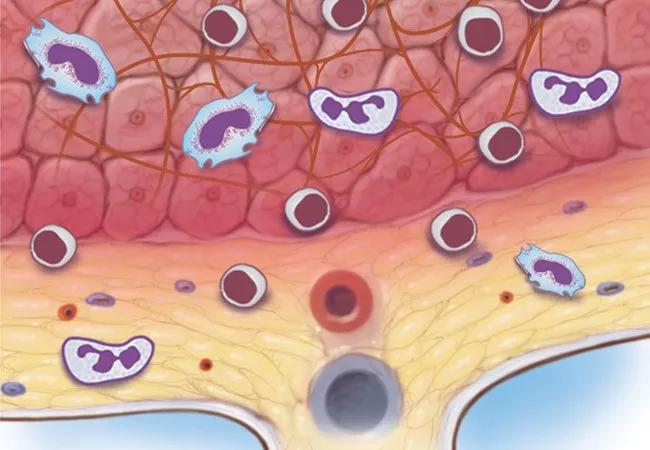Internal award provides funding to cross-disciplinary project

Image content: This image is available to view online.
View image online (https://assets.clevelandclinic.org/transform/eda6e691-d5c2-4778-a112-228ae2cffa42/cells_jpg)
cells
More than half of all patients diagnosed with Crohn’s disease (CD) present with intestinal strictures. Most scientists have long assumed that immune cells are the central players in this process. Researchers from the Department of Inflammation and Immunity and the Department of Molecular Cardiology think there is another hypothesis worth investigating.
Advertisement
Cleveland Clinic is a non-profit academic medical center. Advertising on our site helps support our mission. We do not endorse non-Cleveland Clinic products or services. Policy
Florian Rieder, MD, a physician-scientist who specializes in researching and treating patients with inflammatory bowel disease, CD and ulcerative colitis, and David Van Wagoner, PhD, an expert in atrial fibrillation (AF) research, have teamed up to uncover how fat cells may contribute to CD-related fibrosis and intestinal narrowing.
In CD, the affected sections of the intestines are commonly wrapped in fat — a pathology referred to as “creeping fat.” Interestingly, patients with AF present with creeping fat around the atrium. Since CD and AF are the only diseases in which creeping fat is well characterized, and fibrogenesis is a key characteristic of both, Drs. Rieder and Van Wagoner are teaming up to uncover the mechanisms that may connect creeping fat in CD with intestinal stricture formation.
The research team suspects that creeping fat contributes to the abnormal intestinal narrowing characteristic of CD by inducing smooth muscle cell hyperplasia (increased tissue mass due to cell proliferation). They hypothesize that alterations in free fatty acid metabolism drive this process. The team will conduct a series of cell signaling and proteomic analyses in human tissues and cells to evaluate the direct and indirect interactions between fat cells and intestinal muscle cells.
With a better understanding of how creeping fat contributes to intestinal obstruction, Drs. Rieder and Van Wagoner hope to identify viable therapeutic targets to prevent or treat intestinal stricture formation. This discovery would have great impact as surgery, which is costly and timely, is currently the only option for patients. The proposed studies may also improve understanding of the mechanisms and advance the treatment of AF, the most common cardiac arrhythmia and an important cause of stroke.
Advertisement
This project is one of two projects funded by a new internally funded award, called the Co-Laboratories Award. It encourages new, “start-up” collaborations that bring together researchers from different laboratories to investigate and attack disease from many angles, drawing on the unique expertise and innovations that each laboratory has to offer.
The Co-Laboratories Award is important not just because it forges new and otherwise unlikely collaborations between people across Lerner Research Institute, but also because it makes early stage research possible. This seed funding will provide the data these researchers need to secure larger funds from external sources, like foundations and the National Institutes of Health.
Advertisement
Advertisement
First full characterization of kidney microbiome unlocks potential to prevent kidney stones
Researchers identify potential path to retaining chemo sensitivity
Large-scale joint study links elevated TMAO blood levels and chronic kidney disease risk over time
Investigators are developing a deep learning model to predict health outcomes in ICUs.
Preclinical work promises large-scale data with minimal bias to inform development of clinical tests
Cleveland Clinic researchers pursue answers on basic science and clinical fronts
Study suggests sex-specific pathways show potential for sex-specific therapeutic approaches
Cleveland Clinic launches Quantum Innovation Catalyzer Program to help start-up companies access advanced research technology